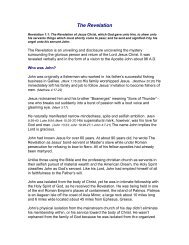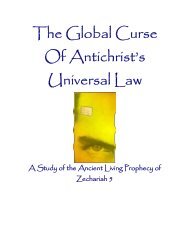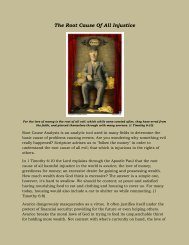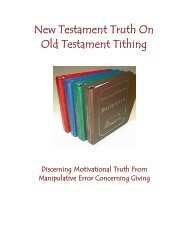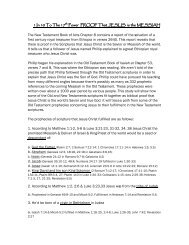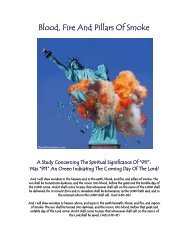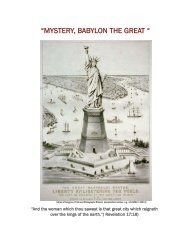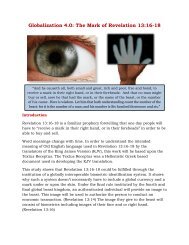the purpose driven music paradigm - Escape Babylon's Demons
the purpose driven music paradigm - Escape Babylon's Demons
the purpose driven music paradigm - Escape Babylon's Demons
Create successful ePaper yourself
Turn your PDF publications into a flip-book with our unique Google optimized e-Paper software.
(Moritz, Fred. Contending for <strong>the</strong> Faith, Bob Jones University Press, Greenville, SC, 2000, p.104.)<br />
It’s founding fa<strong>the</strong>r, Harold J. Ockenga, originally held to <strong>the</strong> biblical doctrine of<br />
separation. In 1947, Ockenga tagged his new movement “New Evangelicalism“. He<br />
began teaching his followers to stop separating from and instead become infiltrating<br />
change agents within apostate churches. Although this infiltration approach isn’t<br />
backed by <strong>the</strong> sound doctrine of scripture, this movement took hold and <strong>the</strong> gradual<br />
descent into <strong>the</strong> prophesied apostasy of 2 Thessalonians 2 was underway.<br />
New Evangelicalism had multiple goals which are subtly fueling <strong>the</strong> gradual descent<br />
into apostasy: address social issues; include with salvation a “social philosophy”;<br />
avoid testing those who teach error; enter into debate concerning biblically related<br />
scientific questions; address intellectual questions using contemporary educational<br />
resources and allow liberty in minor areas. (Dollar, George. A History of Fundamentalism in<br />
America, Bob Jones University Press, Greenville, SC. 1973. p.204.)<br />
Harold Ockenga eventually spread <strong>the</strong> movement throughout America as he rose to<br />
prominence among evangelicals assuming <strong>the</strong> following leadership roles:<br />
1st President of <strong>the</strong> National Association of Evangelicals<br />
Chairman of <strong>the</strong> Board of Christianity Today<br />
1st president of Fuller Theological Seminary<br />
President of Gordon-Conwell Divinity School<br />
Director of <strong>the</strong> Billy Graham Evangelistic Association<br />
(Cloud, David. “Fundamentalism, Modernism, and New-Evangelicalism” (Part 2), O Timothy<br />
magazine, Volume 12, Issue 1, 1995)<br />
Television personality Robert Schuller put legs to Ockenga’s New Evangelical<br />
<strong>the</strong>ology. Dr. Schuller added psychology and marketing principles to New<br />
Evangelicalism. Dr. Schuller’s philosophy of church growth was simple:<br />
Perception must be changed from viewing people as “saved” or “lost” to “churched” and<br />
“unchurched”.<br />
“Find out what impresses <strong>the</strong> unchurched in your community” and do it.<br />
Bring in popular “heroes” to attract <strong>the</strong> multitudes.<br />
Utilize <strong>the</strong> successful principles of Retailing: Accessibility, Surplus Parking, Inventory, Service,<br />
Visibility, and Good Cash Flow.<br />
Pastors should model <strong>the</strong>mselves after businessmen and plan strategically.<br />
“Do not preach expository sermons, you have to win <strong>the</strong>m and build relationships.”<br />
Move from a <strong>the</strong>ocentric approach to ministry to a “human needs approach”.<br />
Dr. Schuller‘s <strong>the</strong>ology categorizes him clearly as an apostate believer and heretic to<br />
be shunned. His <strong>the</strong>ology has been quoted as follows:<br />
“We must begin to say, ‘I am not trying to convert any o<strong>the</strong>r religious people to my viewpoint.’”<br />
“There is no need for one to recognize his own personal sin, no need for repentance, no need



